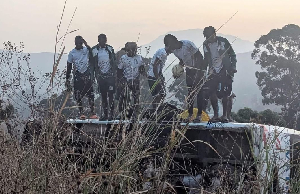As at 25 December 2013, 1,159 Cameroonians trapped in the cross-fire in the Central African Republic had been repatriated home, thanks to the intervention of the Head of State, Paul Biya.
The gruesome accounts of sectarian and religious violence in the neighbouring country make it easy to understand the significance of the President's decision to the affected. Consequently, both Camair-Co and military flights have been mobilised to bring back all Cameroonians in the Central African Republic who want to return home.
Some people may even think the move is a political gimmick, but far from it. The spectre of atrocities that have continued to increase in Bangui, capital of the Central African Republic, smacks of sheer senselessness, with foreigners who must have gone out in search of better living conditions finding themselves at the centre of the carnage.
Thus, when the Head of State began the operation on Friday, 13 December 2013, a total of 516 Cameroonians, including women and children, returned home within one week end.
But when Cameroon's Chargé d'Affaires in Bangui, Nicolas Nzoyoum announced that there are about 20,000 Cameroonians in the C.A.R. and that 3,5000 of the number reside in Bangui alone, many started asking to know what will happen to the others.
Such questions might have been provoked by the fact that there are people who not only follow the drama in the C.A.R. at a distance, but they continue to think that it does not concern them. Yet, Cameroon has been central in terms of finding a lasting solution to the ordeal faced by people in that country.
With close to 1000 Cameroonian soldiers in Bangui who first went as part of the "Force multinational d'Afrique centrale (FOMAC) or the Central African Multinational Force, they have now transformed into the Mission international de soutien à la Centrafrique (Misca) or the International Support Mission to Central Africa headed by a Cameroonian, Brigadier General Martin Tumenta. The Head of State has equally ensured material and financial support to the C.A.R. all as part of efforts to restore peace and stability in the country.
Given such a determination to bring calm and order to Bangui and the rest of the country, it was obvious that President Biya is not only aware of the gravity of the situation, but could not stay back to watch Cameroonians perish in such a precarious environment. This explains why the current intervention has not ended with their repatriations from Bangui. Those being brought back are accompanied right to their areas of origin.
In spite of the diverse origins of those affected, the Head of State did what is needed for them to be transported to all the ten regions of the country. There have been among the repatriated, people who hail from Kousseri in the Far North Region, Maroua town itself. Others from Garoua in the North Region, Ngaoundere and other parts of the Adamaoua Region, the East, Centre, Littoral, West, North West, South and the South West Regions have also seen all their sons and daughters brought back home from the C.A.R.
Equally pathetic has been the number of Cameroonian innocent children trapped in the situation. The last group of returnees had in their midst 143 kids and 78 women of the 216 that came back to Douala. That has been the common feature of each of the groups brought home from the C.A.R.
Even worse narratives that they have given of the torture and killings going on in the C.A.R. has been so sad that the Head of State had to respond to such distress calls in a decisive manner by ordering their repatriation.
Actualités of Monday, 30 December 2013
Source: Cameroon Tribune












